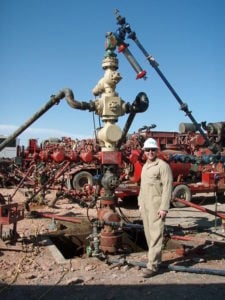
Image: Joshua Doubek
The financial crisis of 2008 devastated the productivity of energy-intensive industries in both the European Union and the United States. Today, while businesses in the EU still struggle to recover amidst increasingly onerous regulatory regimes, many in the United States have emerged strong and optimistic. Their success in this regard is due primarily to low cost energy and abundant material feedstock now flowing from the process of hydraulic fracturing (fracking) in shale fields of America.
According to the European Commission, “EU nations will be left far behind the US unless they address high energy costs that are worsening the continent's industrial decline.” With natural gas costs in the EU four times that of the United States—where fracking is unlocking vast shale gas—EU energy-intensive businesses, including steel, fertilizer, and petrochemical manufacturers, are having an increasingly difficult time competing.
As EU commissioner Antonio Tajani says, “When people choose whether to invest in Europe or the US, what they think about most is the cost of energy. The loss of competitiveness is frightening.”
Yet, rather than promote hydraulic fracturing in the EU, Germany and France have banned the practice. And on January 22, 2014, the European commission published a “recommendation of minimum practices,” which is intended to establish de facto regulations for all EU member countries, and “an Impact Assessment that examined the socio-economic and environmental impacts of various policy options.”
While bureaucrats expend time and resources regulating those who actually make things, many petrochemical producers—already straining under the EU’s stifling regulations—seek the less-expensive electricity and chemical inputs produced by American frackers. Consider some examples:
- The largest U.S.-based chemical company, Dow Chemical, cited energy regulations as the main reason for limiting its chemical investments in Europe during the past decade. Meanwhile, the company plans to capitalize on the fracking revolution by investing an additional $4 billion in the United States during the next few years.
- Another U.S. company, Dallas-based U.S. Celanese Corp, is closing facilities in France and Spain but has announced an $800 million dollar joint venture to build a methanol plant in Clear Lake, Texas.
- Meanwhile, Dutch fertilizer company OCI NV is building what will be the largest methanol plant in the United States at a cost of $1 billion.
- Saudi Basic Industries Corporation (SABIC ) is cutting over 1,000 jobs as it closes some of its EU Facilities, a decision influenced by Europe's “ageing plants, lack of raw materials, over-regulation and a high-wage labour market.”
- According to Chemical Export Report, “In 2012, German investment in new chemical plants or expansions in the US rose 54% to [$4.3 billion]. . . . The US now accounts for 41% of the German chemical industry’s foreign investments, up from 28% in 2005.”
Further enabling production in the United States, American frackers have offset some of the economic harms caused by government controls here. Fabian Zuleeg, chief economist for the European Policy Centre, believes (as summarized by EurActiv.com) that “shale gas represents a silver bullet against crisis-hit industries in America.”
According to the American Chemical Council (ACC), "Despite the hindrance of slow global growth, uncertainty and U.S. tax policies that discourage business investment, these strong gains in capital spending for American chemistry are expected to continue."
“Put simply,” says ACC chief economist T. Kevin Swift, "the U.S. is now the most attractive place in the world to invest in chemical manufacturing."
The credit for this extremely positive development goes to producers in the oil and gas industry—especially to the developers of fracking technology.
Europeans are slowly strangling their energy and manufacturing industries with rights-violating laws and regulations. American frackers and producers who depend on the products of fracking are thriving largely because government better-protects their rights. If Europeans want to see productivity increases in their region—and if Americans want to further bolster productivity here—citizens must demand that government protect rather than violate the rights of producers.
Related:


![[TEST] The Objective Standard](https://test.theobjectivestandard.com/wp-content/uploads/2017/10/logo.png)









